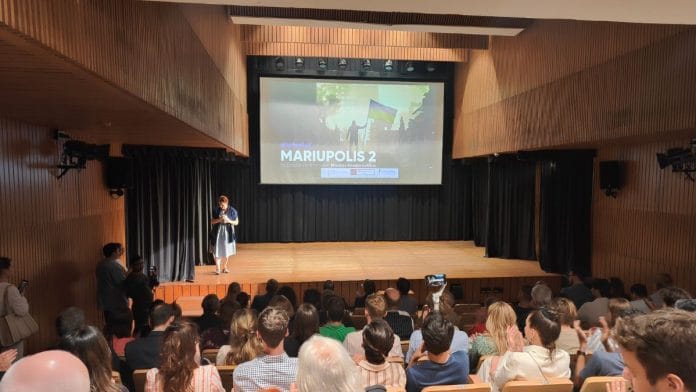A documentary screening at the Alliance Francaise de Delhi saw grief become personal, solidarity transcend borders, and cinema turn into a powerful weapon of remembrance. At the Indian premiere of Mariupolis 2—co-hosted by the embassies of Ukraine and Lithuania—the stories stretched far beyond the borders of the country.
Mariupolis 2 has been rightly described as Lithuanian filmmaker Mantas Kvedaravičius’ epitaph. It’s a series of fragmented but powerful footage that he shot when he returned to the war-torn port city in 2022. It’s where he was killed during Russia’s ‘Siege of Mariupol’.
Both Diana Mickevičienė, the Lithuanian Ambassador to India and Oleksandr Polishchuk, Ambassador of Ukraine to India, emphasised that this was no ordinary film. It is a record document of lives interrupted—a tribute to human endurance in the face of unimaginable destruction.
“I wish this film had never been made,” said Mickevičienė. “I wish this war had never started.” The besieged city has become a symbol of devastation and defiance in the over two-year-long Russia-Ukraine war. For Polishchuk, his connection with Mariupol is deeply personal.
“It was the city of my childhood. Now it’s all gone, shattered,” he said.
Also read: Space for political documentary films is shrinking. No university spaces, a crisis point
An unflinching portrait of war
As the lights dimmed and the first scenes unfolded, the audience was transported—not just to Mariupol—but to the heart of a tragedy that still feels raw, immediate, and brutally real.
From the first frame, the audience was struck by the silence—not just the literal quiet in the theatre, but the quiet of the people on screen. Their lives had been torn apart, but they would wake up every morning to face a new day.
There are no grand monologues. Instead, the documentary offers glimpses of daily life and ruin
A child playing near the rubble, a woman boiling water amid the ruins, a brief flash of joy as friends share a laugh despite the devastation around them. The constant question, echoed throughout the film, is whether the dead can ever be left in peace.
“Both camps are meat. They should hug and ask for forgiveness,” said one of the people interviewed in the film.
The haunting sounds of distant shelling to the quiet of streets that once bustled with life—it’s one landscape after another, saying more than dialogues can.
As the camera lingered on these moments, the audience was forced to confront the painful reality—these were not just scenes from a warzone; these were lives hanging in the balance. Ordinary people trying to find hope in the unlikeliest of places.
“You all reminded us that we are not just talking about cinema, we are talking about reality, a reality that’s harsh and keeps going on,” said Patricia Loison, director of Alliance Française de Delhi.
Also read: Deepa Mehta is back with a film on transwoman Sirat Taneja. ‘All good art is political’
More than cinema
Kvedaravičius, who reported from war-torn regions, paid with his life. He was killed in Mariupol while filming, and it was left to his fiancée, Hanna Bilobrova, to get the footage out of the war zone and complete the film.
Throughout Mariupolis 2, Kvedaravičius deftly weaves between moments of hope and despair.
“Where should we go? Go home? We don’t have a house,” cried one woman. Another scene shows an elderly man holding pigeons, speaking to them softly. “Couldn’t you go away from here?” he asked, his question as much for the birds as for himself, trapped in a city where escape seems impossible.
As the lights came up, the auditorium was silent. There were no casual post-screening conversations, no applause. Instead, there was a shared understanding that everyone had seen something deeply important. It could not be unseen.
“This is not just about Ukraine. It’s about all of us,” said Mickevičienė.
(Edited by Theres Sudeep)






